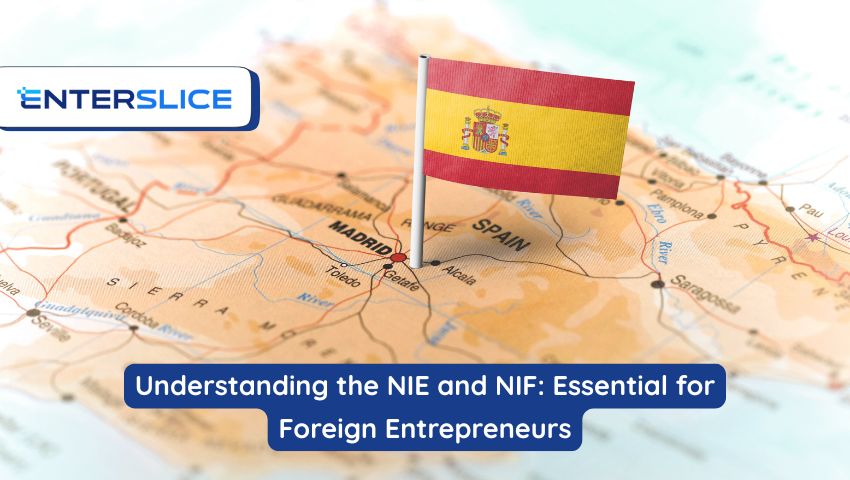
If you’re an entrepreneur considering company registration in Spain, understanding the legal and administrative landscape is key to a smooth start. Among the most important — yet often misunderstood — steps are obtaining your NIE and NIF numbers. These two identifiers are essential for foreign nationals planning on opening a company in Spain or engaging in any formal economic activity in the country.
In this guide, we’ll break down what the NIE and NIF are, how they differ, and why both are crucial when you register a company in Spain. Whether you’re launching a startup in Barcelona or setting up a consultancy in Madrid, this is a must-read before you begin.
What Is an NIE?
The NIE (Número de Identificación de Extranjero) is a personal identification number issued to foreign nationals by Spanish authorities. Think of it as your tax ID and legal identity for all financial or legal activities in Spain.
If you’re a non-Spanish resident and you plan to:
-
Start a business
-
Purchase property
-
Open a bank account
-
Pay taxes
-
Sign any legal document
Then the NIE is mandatory. It’s not just a formal requirement — it’s the number that ties you to any legal or financial transaction in the country.
For entrepreneurs, every shareholder and director involved in company registration in Spain must obtain their own NIE before proceeding.
What Is a NIF?
The NIF (Número de Identificación Fiscal) is a tax identification number used by individuals and legal entities for fiscal purposes. For Spanish citizens, the NIF is the same as their national ID number. For companies, it’s a different number altogether, used to identify the business in tax matters.
When you register a company in Spain, your business will be issued a corporate NIF, which is required for:
-
Paying taxes
-
Issuing invoices
-
Importing/exporting goods
-
Signing contracts under the company name
In short, individuals get an NIE, companies get a NIF — and if you’re setting up a business, you’ll need both.
NIE vs. NIF: Key Differences
Here’s a quick comparison to clarify the difference:
| Aspect | NIE | NIF |
|---|---|---|
| Who receives it? | Foreign individuals | Legal entities (businesses) |
| Purpose | Legal identification for individuals | Tax ID for the company |
| Required for | Opening a bank account, signing contracts, buying property | Company operations, invoicing, taxes |
| Format | Begins with an “X,” “Y,” or “Z” | Begins with a letter based on company type (e.g., B for SLs) |
So, if you’re a foreigner opening a company in Spain, you’ll first need an NIE for yourself (and any other shareholders), and then obtain a NIF for your business after incorporation.
When and How to Obtain the NIE
Getting an NIE should be your first step before you register a company in Spain.
Options to apply:
-
In Spain – You can apply in person at a National Police station with a foreigners’ department.
-
From abroad – Apply through a Spanish consulate in your home country.
-
Via a legal representative – You can authorize a Spanish lawyer or gestor to apply on your behalf.
Required documents usually include:
-
Passport copy and original
-
Completed EX-15 form
-
Proof of the reason for your NIE application (e.g., company formation documents or investment plans)
-
Payment of the government fee (Modelo 790)
The process typically takes anywhere from a few days to a few weeks, depending on your location and whether you apply personally or through a representative.
How to Obtain the Company’s NIF
Once you’ve received your NIE and submitted your incorporation documents, your company will be issued a provisional NIF by the Spanish Tax Agency (Agencia Tributaria).
Steps include:
-
Submitting your application to the Tax Agency with proof of incorporation.
-
Once approved, you receive a provisional NIF, valid for up to six months.
-
After completing full company registration, including registration in the Mercantile Registry, you’ll be issued a definitive NIF.
The NIF is crucial for legally conducting business — it must appear on all invoices, contracts, and tax filings.
Also Read: Legal Documents Required for Company Registration in Lebanon
Why This Matters for Company Registration
Skipping or delaying the NIE and NIF process is one of the most common mistakes we see among foreign entrepreneurs. Spain’s legal framework is bureaucratic by nature, and having these identifiers in place is required for nearly every major business activity.
When you’re opening a company in Spain, a lack of NIE numbers for directors or shareholders can halt your registration process altogether. And without a NIF, your business can’t legally operate, invoice clients, or file taxes.
It’s smart to start these applications early — ideally, before you begin preparing the Articles of Association or signing lease agreements.
Expert Tips for a Smooth Process
-
Work with a local advisor: Spanish bureaucracy can be complex. Having a local law firm or gestor assist you can save weeks of delays and miscommunications.
-
Plan for delays: Especially during peak seasons or political holidays, processing times can extend.
-
Keep digital and hard copies: Always store certified copies of your NIE and your company’s NIF for use in legal and banking transactions.
Conclusion
Understanding the difference between the NIE and NIF is essential if you’re planning on company registration in Spain. Both numbers are foundational — one identifies you as a legal person, and the other identifies your business in the eyes of the Spanish government.
Whether you’re setting up a tech startup in Valencia or a consulting firm in Seville, you’ll need to ensure you and your business are properly registered. Getting your NIE and your company’s NIF isn’t just a formality — it’s the key that unlocks the ability to legally and successfully register a company in Spain.
FAQs
1. Can I start the company registration process in Spain without an NIE?
No. All foreign individuals involved in the company, including directors and shareholders, must have an NIE before the registration process can be completed.
2. Is the NIE the same as the NIF?
No. The NIE is for foreign individuals, while the NIF is assigned to legal entities like companies. Both are required when opening a company in Spain as a non-resident.
3. How long does it take to get an NIE and a company NIF?
An NIE typically takes 1–3 weeks, depending on where you apply. The provisional NIF can be obtained within a few days once incorporation documents are filed.



